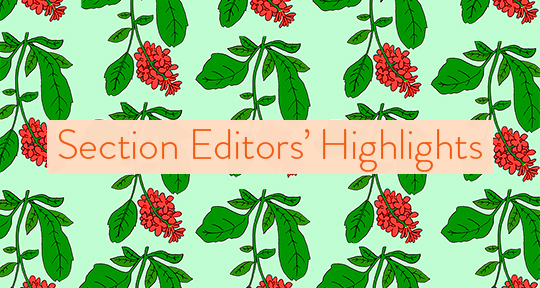We thought of the Winter 2020 issue as a fantastic salad, surprising and delightful in its compact variety. We’re willing to concede, however, that it is a large salad; the challenges it presents might be more approachable if they’re coming from a buffet. With so many delights and delectables on offer, where does one begin? Perhaps, we humbly suggest, with these selections from our section editors, which include a Federico García Lorca play and an Eduardo Lalo essay.
From Lee Yew Leong, Fiction, Poetry, and Kurdish Feature Editor:
Brought into English by Caitlin O’Neil (a former team member, I’m thrilled to say), Corinne Hoex’s sensuous—and sensational—Gentlemen Callers is full of exquisite treats, rivaling Belgian compatriot Amélie Nothomb’s wit, humor, and imagination. Although Asymptote makes it its mission to move beyond world literature’s Eurocentric focus, it’s gems like this that remind me that there’s still much to discover from smaller, less heard-from countries within Europe. I would consider it scandalous if Hoex’s fiction is still unknown in the world literature canon ten years down the road. From the Poetry section, Gnaomi Siemens accompanies her sexy, updated take of Ephemeris (horoscopes from the 16th century) with a thought-provoking note: “Horoscopes (hora / time, skopos / observation) are ephemeral. Translation is an observation of time and a holding up of the writings and ideas of one time to observe them in a new temporal context.” Pair with Joey Schwartzman’s 21st-century renderings of T’ang dynasty poet Bai Juyi. Whip-smart and bittersweet, these timeless poems about transience will stay with you for at least a little while.
From Sam Carter, Criticism Section Editor:
This issue’s Criticism section introduces us to two poetry collections that embody the Asymptote mission by refusing to be contained by borders, whether linguistic or geographic. Our very own Lou Sarabadzic takes us through the important work done by Poetry of the Holocaust: An Anthology, which contains poems from ninety-three writers and nineteen languages in order to provide a comprehensive portrait of this terrible atrocity. And Emma Gomis reviews Time, Etel Adnan’s latest exploration of temporality and poetic form that arose from a series of postcards exchanged with the Tunisian artist Khaled Najar. READ MORE…


